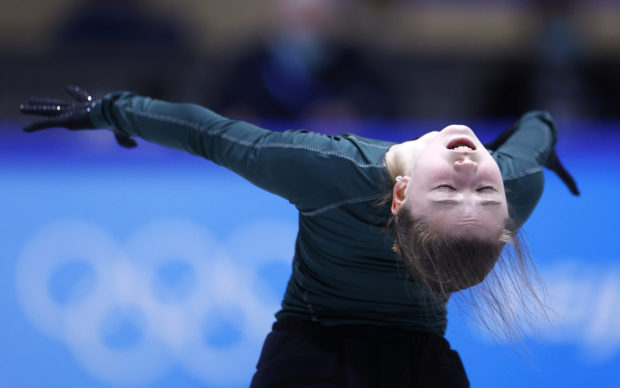
2022 Beijing Olympics – Figure Skating – Training – Training Rink Capital Indoor Stadium, Beijing, China – February 11, 2022. Kamila Valieva of the Russian Olympic Committee during training REUTERS/Evgenia Novozhenina
BEIJING — Russian skating prodigy Kamila Valieva’s failed drug test prior to her dazzling Winter Games team gold threw the 15-year-old’s Olympic future into doubt and reawakened global anger over Moscow’s doping history on Friday.
But the Kremlin – already facing Western diplomatic wrath over a troop buildup near Ukraine – was also defiant in the sporting terrain, calling Valieva’s case a “misunderstanding”.
“Hold your head up, you’re a Russian,” government spokesman Dmitry Peskov urged her. “Go proudly and beat everyone.”
The teenager became the first woman to land a quadruple jump at the Olympics on Monday, winning a team figure skating gold with the Russian Olympic Committee (ROC).
However, the International Testing Agency (ITA) said she had tested positive for banned heart drug trimetazidine in a urine sample collected by Russian authorities back on Dec. 25 – though confirmation of that only came this week.
Valieva is due to compete again on Tuesday in the women’s individual event. By then, the Court of Arbitration for Sport (CAS) should have ruled on her case from a closed boardroom on the second floor of a Beijing hotel.
She is one of the youngest Olympians ever to test positive.
Many fans and fellow athletes were furious at how Valieva came to have a prohibited drug in her system, blaming coaches, medics and authorities rather than her.
“It is a shame, and the responsible adults should be banned from the sport forever!!!” said German figure-skating great Katarina Witt. “What they knowingly did to her, if true, cannot be surpassed in inhumanity and makes my athlete’s heart cry infinitely.”
Former U.S. figure skater Adam Rippon, who is in Beijing as a coach, summed up Valieva’s plight by saying: “This entire situation is heartbreaking… she is a minor. The adults around her have completely failed her. They’ve put her in this awful situation and should be punished.”
One Twitter user under the name “Fran” said despite widespread sympathy towards Valieva, she had to be banned.
“Kamila Valieva is absolutely a victim in this scenario. However now that we know she really did test positive to TMZ, they absolutely can NOT let her compete,” the post said.
‘Honest’ medal?
Russian athletes are already competing in Beijing as the Russian Olympic Committee (ROC) – without their national flag and anthem – due to past sanctions for state-sponsored doping.
The latest controversy blew up after a testing lab in Sweden reported on Tuesday that Valieva’s sample had been positive – the day after she wowed the world at the Capital Indoor Stadium.
Questions hang over why there was such a delay between her test and the result, which allowed her to travel to Beijing.
Russian Olympic Committee president Stanislav Pozdnyakov said Valieva’s test may have been deliberately held back to coincide with the end of the team competition.
The ROC said it was taking comprehensive measures to protect its athletes and to keep an “honestly” won gold. It said Valieva’s tests were negative before and after Dec. 25.
In an Instagram post featuring Valieva as an angel, the ROC urged fans to show their support to “a very young, fragile, charming girl” as she “faced the hardest test” of her life.
Russia’s own anti-doping agency RUSADA imposed a provisional suspension on Valieva after Tuesday’s result then lifted it a day after on appeal. On Friday, RUSADA said it was investigating her support team and attributed the delay in results to COVID-19 cases at the Swedish laboratory, TASS news agency reported.
With their reputations for fairness on the line, the International Olympic Committee (IOC) and the World Anti-Doping Agency (WADA) asked CAS to reinstate the suspension.
“We have a 100% policy against doping,” IOC spokesman Mark Adams said.
Late on Friday CAS confirmed it had received applications from the IOC and WADA appealing RUSADA’s decision to lift the suspension and said a decision will be made in due course.
Still skating
Valieva, wearing a navy hoodie and black tights under padded shorts, skated again in practice on Friday afternoon.
The controversy over her has delayed the medal ceremony for the team event, with the United States and Japan waiting in the wings after taking silver and bronze positions. Canada finished fourth.
CAS’s ruling will not only determine if the ROC will be disqualified from the team event, thus losing their gold medal, but also if Valieva will be allowed to compete in the women’s individual competition.
Travis Tygart, head of the U.S. Anti Doping Agency (USADA), expressed sympathy for Valieva, but said the U.S. could use new laws to prosecute those around her.
“Clean athletes deserve better, and this poor young woman deserves better,” he told Reuters. “She’s getting chewed up (for doping) on top of being abused by the Russian state system.”
The United States could prosecute the Russians involved in Valieva’s case under the American Rodchenkov Act (RADA).
It was signed into law in 2020 and empowers American prosecutors to seek fines of up to $1 million and jail terms of up to 10 years, even for non-Americans, if actions have affected American athletes’ results.
Former WADA deputy head Rob Koehler said the global bodies in charge of eradicating doping were to blame for being too lenient on Russia in the past.
“By not banning Russia for four years, there was no need or desire for cultural change by Russian authorities,” he said. “WADA, IOC and CAS favoured the power and influence of Russian sport over clean sport.”
RELATED STORY:
What is trimetazidine, the drug at the center of Russian skater Valieva’s doping drama

